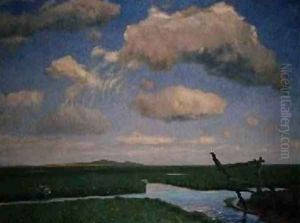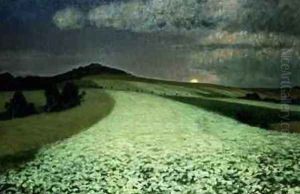August (Fritz) Overbeck Paintings
Friedrich August von Overbeck, known as Fritz Overbeck, was a German painter and a member of the artists' colony in Worpswede, Germany. Born on September 15, 1869, in Bremen, Overbeck was part of a movement that sought to escape the urbanization of Germany in the late 19th century and return to nature for inspiration. His early work was influenced by the academic painting tradition, but he soon developed a style that was more naturalistic and focused on the landscape and rural life.
Overbeck studied at the Düsseldorf Academy of Arts under the guidance of renowned professor Peter Janssen. He later moved to Worpswede, where he joined other artists such as Heinrich Vogeler, Hans am Ende, and Otto Modersohn. These artists were known for their plein air painting and their desire to capture the simplicity and beauty of the northern German countryside. Overbeck was particularly drawn to the vast moors and the simple life of the peasants in the area.
In Worpswede, Overbeck met and married fellow artist Hermine Rohte, who was also a member of the artists' colony. Their relationship was both a personal and professional partnership, and they often worked together on their artistic projects. Overbeck's paintings from this period are characterized by their vibrant color palette, solid composition, and empathetic portrayal of peasant life.
Overbeck's work received critical acclaim during his lifetime, and he exhibited his paintings at various prestigious venues, including the Berlin Secession. Unfortunately, his career was cut short by his untimely death on June 9, 1945, in Bremen. Today, his work is held in several museum collections and is recognized for its significant contribution to the landscape genre in German art. The Overbeck Museum in Worpswede is dedicated to the life and work of Fritz Overbeck and his wife Hermine, preserving their legacy and showcasing their contributions to the Worpswede artists' colony.

